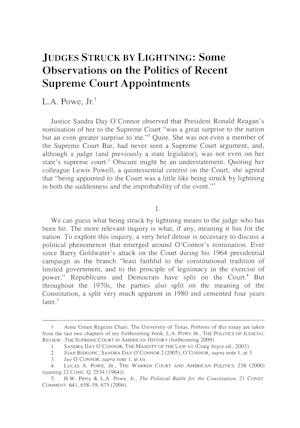Judges Struck by Lightning: Some Observations on the Politics of Recent Supreme Court Appointments
January 2007

DISCLAIMER: This text has been transcribed automatically and may contain substantial inaccuracies due to the limitations of automatic transcription technology. This transcript is intended only to make the content of this document more easily discoverable and searchable. If you would like to quote the exact text of this document in any piece of work or research, please view the original using the link above and gather your quote directly from the source. The Sandra Day O'Connor Institute does not warrant, represent, or guarantee in any way that the text below is accurate.
Article Text
(Excerpt, Automatically generated)
JUDGES STRUCK BY LIGHTNING: Some
Observations on the Politics of Recent Supreme Court Appointments
L.A. Powe, Jr.
Justice Sandra Day O'Connor observed that President Ronald Reagan's nomination of her to the Supreme Court "was a great surprise to the nation but an even greater surprise to me."1 Quite. She was not even a member of the Supreme Court Bar, had never seen a Supreme Court argument, and, although a judge (and previously a state legislator), was not even on her state's supreme court.2 Obscure might be an understatement. Quoting her colleague Lewis Powell, a quintessential centrist on the Court, she agreed that "being appointed to the Court was a little like being struck by lightning in both the suddenness and the improbability of the event."3
I.
We can guess what being struck by lightning means to the judge who has been hit. The more relevant inquiry is what, if any, meaning it has for the nation. To explore this inquiry, a very brief detour is necessary to discuss a political phenomenon that emerged around O'Connor's nomination. Ever since Barry Goldwater's attack on the Court during his 1964 presidential campaign as the branch "least faithful to the constitutional tradition of limited government, and to the principle of legitimacy in the exercise of power," Republicans and Democrats have split on the Court.4 But throughout the 1970s, the parties also split on the meaning of the Constitution, a split very much apparent in 1980 and cemented four years later.5
